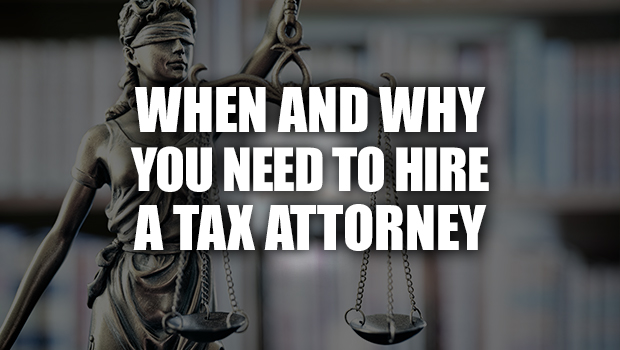The tax laws and regulations in the U.S. can be confusing and frustrating at times. On occasion, this will result in taxpayers getting into trouble with the IRS. But not all disputes or tax questions require the help of a tax attorney. This blog post will examine situations when hiring a tax lawyer might be useful and the reasons for using a tax lawyer’s services.
Is a Tax Attorney Actually Required?
In most tax disputes, a taxpayer is not legally required to have a tax lawyer represent them. Whether it’s litigating in Tax Court or handling an audit, a taxpayer can choose to handle these tax matters themselves.
In some cases, this is a reasonable decision. But often it’s not, especially when there’s a lot of money at issue or complex legal arguments that need to be made.
When a Taxpayer Should Hire a Tax Lawyer
Hiring a lawyer costs money, so it’s understandable that someone might hesitate to hire a tax lawyer. But there are a variety of situations where that money is very well spent and can help the taxpayer avoid paying far more money or even avoid jail time.
An audit involving a complex tax issue
Many audits take place over mail and largely involve providing documentation to the IRS to support the income, deductions or credits claimed on a tax return. When there are questions about what documents the taxpayer should produce and the legal basis for something the taxpayer claimed on a tax return, having the assistance of a tax lawyer is highly advisable.
An accusation of a tax crime
If a taxpayer is being accused of tax fraud or tax evasion, hiring an attorney is almost always a good idea. These charges are very serious and instead of just worrying about getting saddled with annoying document requests or having to pay money, a taxpayer is potentially looking at going to prison.
Negotiating with the IRS
In certain situations, a taxpayer might accept the IRS’ position on a particular tax issue, such as the amount of taxes owed. However, the taxpayer might still be able to negotiate with the IRS to pay less than the amount owed. An offer in compromise is a good example of this.
Privileged communications
A conversation between a lawyer and a client is among the most strongly protected type of privileged communication. This privilege exists to some extent between accountants and their clients. Yet there are more limitations with the accountant-client privilege when compared to the attorney-client privilege.
Taxpayers wishing to discuss sensitive tax and legal matters with a tax professional, but retain the most protections for those conversations, will want to hire a tax attorney to have the benefit of the attorney-client privilege.
In Conclusion
These are just a few of the benefits and reasons for hiring a tax attorney as opposed to a different type of tax professional or handling your tax issue yourself. If you’re not sure if hiring a tax attorney is necessary, remember that it doesn’t hurt to reach out to one and see if their knowledge and experience can benefit you.

